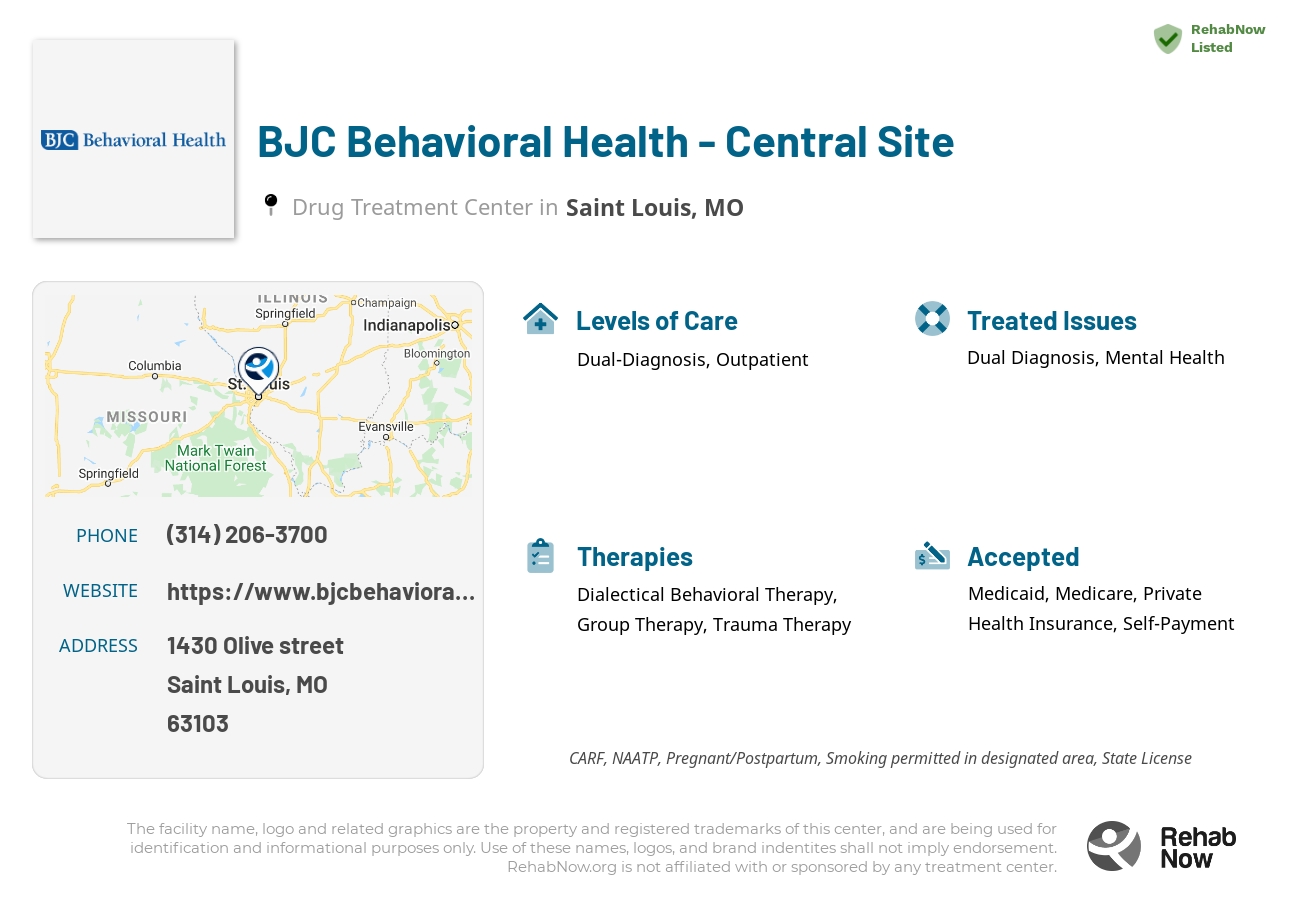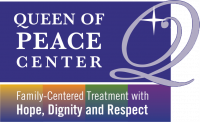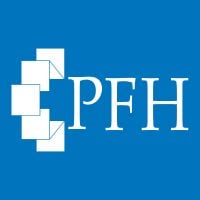
BJC Behavioral Health - Central Site
Drug Rehab Center in Saint Louis, Missouri
- Mental Health
- Dual Diagnosis
- Drug Addiction
BJC Behavioral Health - Central Site offers evidence-based, dual diagnosis care for individuals who are struggling with both mental health and substance abuse issues, within a compassionate environment featuring qualified clinicians, state-of-the-art treatment options, and acceptance of most private insurance plans, all certified by JCAHO.
About This Missouri Facility
Located in Saint Louis, MO, BJC Behavioral Health Central Site is an esteemed treatment facility specializing in overcoming drug and alcohol addiction and addressing co-occurring mental health disorders. This accredited center stands out for its community-integrated approach and a broad spectrum of care for both adolescents and adults.
- Comprehensive care for dual diagnosis: BJC Behavioral Health’s treatment program is tailored to meet the unique needs of individuals battling both addiction and mental health issues.
- Peer recovery support: By pairing clients with trained peers who have navigated similar paths, the center fosters a supportive community to inspire and guide recovery.
- Extensive support services: From vocational support to housing assistance, BJC ensures a holistic recovery journey, helping clients reintegrate into society with stability and purpose.
Accredited by the Joint Commission on Accreditation of Healthcare Organizations (JCAHO), BJC Behavioral Health Central Site is built on a foundation of evidence-based practices. Its multidisciplinary team offers personalized treatment plans encompassing individual, group, and family therapy, underlined by a commitment to long-term recovery and wellbeing.
The center addresses a range of addictions and mental health challenges, employing a variety of treatment methods, including medication, therapy, and aftercare planning. Its residential and outpatient services cater to both adolescents and adults, focusing on providing the skills needed for sustained sobriety and mental health stability.
Genders
Ages
Modality
Additional
Accreditations

JCAHO
Conditions and Issues Treated
When addiction and psychiatric issues co-occur, the addict’s recovery is more successful when both conditions are treated. A dual diagnosis refers to a condition in which the patient is diagnosed with two health issues: addiction and bipolar disorder. The most common therapies are psychotherapy, behavioral therapy, spiritual counseling, 12-step programs, and medication management.
Levels of Care Offered at BJC Behavioral Health - Central Site
This center offers a variety of custom treatment tailored to individual recovery. Currently available are Dual-Diagnosis, Outpatient, with additional therapies available as listed below.
An outpatient treatment program is set up to help with alcohol or drug addiction or a co-occurring disorder. The patient must attend the facility for their therapy and other programs but can return home each night.
The frequency of mandatory attendance decreases after much of BJC Behavioral Health - Central Site‘s program is complete.
Outpatient treatment is a recovery approach that allows recovering addicts to live at home while getting rehab for addiction
An outpatient can include day treatments which include attending group sessions one hour per week. A person living in an outpatient environment may be allowed the opportunity to work full time if they choose to and continue studies without interruption from drugs/alcohol.
Outpatient treatment is an option for people who want to maintain their careers and families. Outpatients live at home but attend treatment such as individual counseling, group counseling, or twelve-step meetings during the day.
Therapies & Programs
At BJC Behavioral Health - Central Site , to learn from past mistakes and improve one’s situation, the recovering person meets individually with a therapist. The counselor or therapist will address addiction causes, triggers, mental issues, dual diagnosis, and aftercare plans during this time. This is a very intense and challenging process. Some clients find it easier to open up to someone other than family or friends who understand their struggles with addiction.
Family therapy is a crucial part of drug treatment and getting sober. It is one of the most effective ways to help addicts stay on the path to long-term sobriety. An addict’s family can play a vital part in helping them to avoid relapse. They can spot the warning signs and help them get back on track.
In group therapy, recovering addicts meet with a therapist and other people in recovery. Some groups are closed, meaning only people who share the same addiction or problem can attend. Others are open to anyone who wants to stop using drugs or drinking alcohol. Group therapy sessions typically focus on one topic each week or month so that recovering addicts can discuss issues they face daily.
Trauma therapy allows people to face and learn from past traumas.
Many people suffer childhood traumas that lead to adult addiction. During treatment at BJC Behavioral Health - Central Site [/type], you can move forward in your recovery and reclaim your sober future! Trauma is a common cause of psychological disorders like Addiction Disorder. It’s common in Addictive Disorders patients because traumatized people have strong emotions or thoughts that lead to addictive behaviors.
Dialectical Behavior Therapy (DBT) is a type of therapy created in the late 1980s and early 1990s. It was designed to help people with high rates of suicidal behavior.
The goal of DBT is to teach mindfulness, distress tolerance, emotion regulation, and interpersonal effectiveness to help people learn how to live a life that is no longer controlled by overwhelming emotions and urges.
DBT is beneficial in treating drug addiction because it helps patients understand and cope with their cravings for drugs or alcohol rather than turning to those substances as a way of coping.
Cognitive Behavioral Therapy (CBT) is based on the idea that how we feel, think and act all interact together. It helps people explore their thoughts for problems (or false beliefs) that influence their mood and actions. CBT is very goal-oriented, which means that the therapist and patient work together on a specific problem. In addition to helping a client focus on thoughts that can be changed, CBT also allows them to take an active role in their treatment. Our thoughts determine our feelings and behaviors; our feelings affect our thoughts, and our behaviors change our thoughts and feelings.
Payment Options Accepted
For specific insurance or payment methods please contact us.
Is your insurance accepted?
Ask an expert, call (888) 674-0062
BJC Behavioral Health Associated Centers
Discover treatment facilities under the same provider.
- BJC Behavioral Health - Southeast Site in Farmington, MO
- BJC Behavioral Health - North Division in Bridgeton, MO
- BJC Behavioral Health - South Site in Saint Louis, MO
Learn More About BJC Behavioral Health Centers
Additional Details
Specifics, location, and helpful extra information.
Saint Louis, Missouri 63103 Phone Number(314) 206-3700 Meta DetailsUpdated April 15, 2024
Staff Verified
Patient Reviews
There are no reviews yet. Be the first one to write one.
Saint Louis, Missouri Addiction Information
Opioid-related overdoses in Missouri have been increasing steadily for the past three decades. In 2018, more than 1,130 people in Missouri died from opioid abuse. Methamphetamines and marijuana abuse have surpassed opioid abuse in Missouri. Missouri is the number 1 methamphetamine manufacturer in the country with more than 27 meth labs per 100,000 people.
Saint Louis, Missouri, has a severe drug addiction and abuse problem. In fact, according to recent statistics, Saint Louis ranks in the top 10% of cities in the United States with the highest rates of drug abuse. Some of the most commonly abused drugs in Saint Louis include cocaine, methamphetamine, and heroin. Some types of treatment available in Saint Louis, MO, include detox, inpatient treatment, outpatient treatment, and 12-step programs.
Treatment in Nearby Cities
- Butler, MO (225.2 mi.)
- Sullivan, MO (59.6 mi.)
- Raymore, MO (229.7 mi.)
- Farmington, MO (60.0 mi.)
- Maryville, MO (276.1 mi.)
Centers near BJC Behavioral Health - Central Site

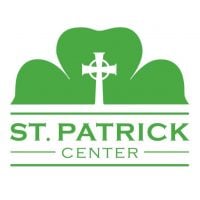
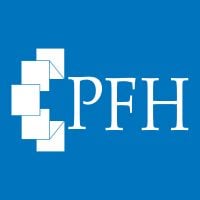
The facility name, logo and brand are the property and registered trademarks of BJC Behavioral Health - Central Site, and are being used for identification and informational purposes only. Use of these names, logos and brands shall not imply endorsement. RehabNow.org is not affiliated with or sponsored by BJC Behavioral Health - Central Site.


